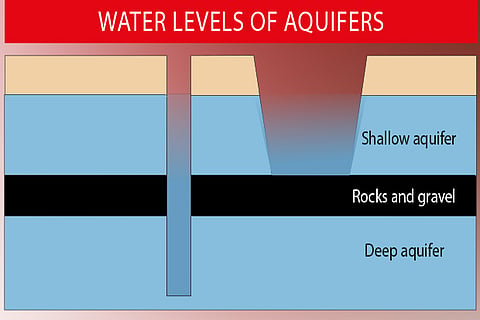

Chennai
At present, Metro Water is monitoring groundwater level in the city every month and readings are taken from 120 open monitoring wells, which can only measure the water level in the shallow aquifer. However, only a few residents use open wells, with a majority drawing groundwater using deep borewells. Shallow aquifer only fills open wells.
“As of now, we do not have facilities to monitor deep aquifers, which are getting exhausted fast. Though we have rainwater harvesting structures to replenish the water level in the shallow aquifer, there is no engineering method to recharge deep aquifers,” a Metro Water official said.
The official added that the proposal has been sent to the government for its permission to dig bore wells and to install water level monitoring devices. Once the approval is obtained, the water manager would monitor and release the information in the public domain periodically.
S Janakarajan, former professor of Madras Institute of Development Studies (MIDS), said that while shallow aquifer will be recharged naturally during rains, the deep aquifer need to be recharged artificially. “After repeated exhortation, the government finally understood the importance of deep aquifer and requested people to convert abandoned bore wells into groundwater recharge wells. Abandoned bore wells are assets and we should not close them,” Janakarajan added. When asked how the deep aquifers can be recharged, the Metro Water official said that the water level could be increased by filtering and letting the roof water into the bore wells – both abandoned ones and those in use.“Usually a layer of hard rock or clay separates the shallow aquifer and deep aquifer. This layer prevents percolation of water. Letting rainwater into bore wells will not necessarily increase the water level in one’s land. But this would increase the level deep aquifers in the region. Also, a small amount of water would go into the deep aquifer through tiny cracks and gaps in the rock layer,” the official explained. Several bore wells in the city had gone dry when the city witnessed one of its worst water crisis during this summer. This forced the residents to be completely dependent on Metro Water supply, which was insufficient. Even after receiving good spells of rain, several residents are finding difficult to draw bore well water.
“Presently, some residents whose bore wells went dry during summer are tapping groundwater. This is from the shallow aquifer, which will not sustain for a longer period if they fail to recharge deep aquifers,” the official cautioned.
As per Metro Water data, city’s average groundwater level (shallow aquifer) has increased up to 2.44 metres.
Visit news.dtnext.in to explore our interactive epaper!
Download the DT Next app for more exciting features!
Click here for iOS
Click here for Android